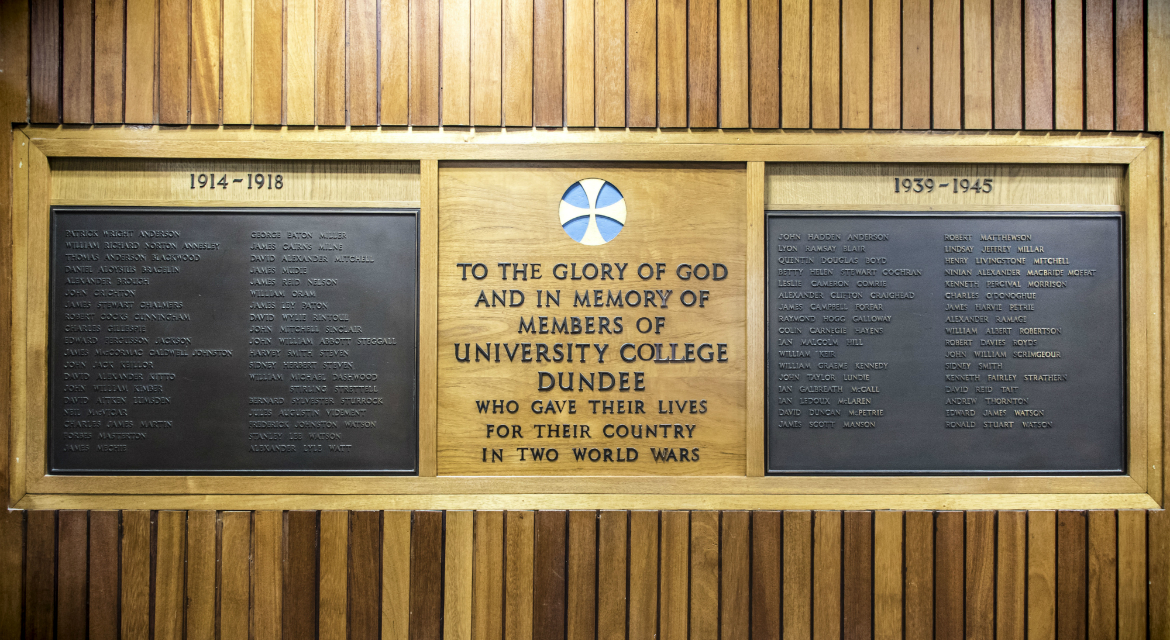Official memorial significantly underestimates number of war dead
Published On Thu 29 Nov 2018 by Dominic Glasgow

The number of staff, students and alumni of University College, Dundee who died during World War I may be more than double the number previously thought, according to new research from the University of Dundee.
While the official war memorial recorded 37 staff, students and alumni who died, Dr Kenneth Baxter has discovered that far more than that number lost their lives. University College was the forerunner of the University, where Dr Baxter works as an archivist.
The revelations came in Tayside at War, a new book published by Abertay Historical Society. Dr Baxter, President of the Society, is one of nine authors who explored the many different ways the Great War impacted on the area in the publication and his chapter looked at how the conflict changed the face of University College.
“The Great War had an enormous impact on University College,” said Dr Baxter. “Staff and students flocked to join the War effort, which meant those left behind faced real challenges. While the nature of surviving records means that the true number of War dead with connections to UCD might never be known, my own research would suggest that the War Memorial records less than half of those who died.
“I have come across an additional 39 former students, some of whom were studying at University College when they died, who were either recorded as War deaths by the Commonwealth War Graves Commission or appear on other memorials or rolls of honour. There were also serving Governors and ex-Governors who we know died as well as other possible casualties that I have not been able to prove one way or another.”
Dr Baxter also uncovered other ways in which the Great War impacted on University College, Dundee, including the treatment meted out to popular staff members who, through an accident of geography, found themselves on the “wrong side”.
He continued, “Dr Wilhelm Stede, the lecturer in German since 1912, was suspended by the Court of the University of St Andrews as he was a German national. He was later one of a group of five Germans and one Austrian arrested and removed from Dundee as ‘alien enemies’ and left behind an American wife and young child. Despite support for Stede's case from local notables, including UCD Professors Stalker and Kynoch, there was no reprieve. He was eventually informed his employment would be terminated.
“A paradox was the eagerness of his students to join the War effort. By December 1914, 48 UCD students, or 36% of male students, were in the forces and it was opined that this rate would have been even higher if it was not for the fact that many male students were too young to legally enlist. This brought very good press coverage and praise for patriotism, however, it meant student numbers dropped substantially.
“Given that UCD's financial circumstances were a frequent cause for concern, the resulting drop in income was a major issue for the College. Equally there was a suspicion that some staff who had done war work would get more lucrative offers and not return after the War.”
Tayside at War, produced to mark the centenary of the end of WWI, is the Society’s 59th publication. This new volume is edited by Dr Billy Kenefick, Honorary Senior Research Fellow at the University, and Dr Derek Patrick, formerly a member of the University’s History department.
The Abertay Historical Society was founded in 1947 and has been publishing books relating to the History of Tayside and North Fife for the past 65 years. The Society was a founding partner in the award-winning Great War Dundee Commemorative Project and has held several events over the last few years to promote awareness and understanding of the local impact of the conflict.
The book will be launched at 11am on Saturday 1 December at the Dalhousie Building, University of Dundee.
For media enquiries contact:
Dominic Glasgow
Media Relations Officer
University of Dundee
Nethergate, Dundee, DD1 4HN
Tel: +44 (0)1382 385131
Email: d.w.glasgow@dundee.ac.uk